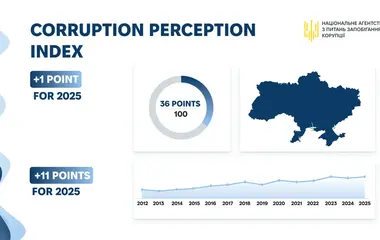The Verkhovna Rada of Ukraine has submitted amendments (12374-d) to Article 51-4 ‘Lifestyle Monitoring of Declaring Entities’ of the Law of Ukraine ‘On Prevention of Corruption’, which may destroy the lifestyle monitoring tool (LM) carried out by the National Agency on Corruption Prevention (NACP). At the next plenary session, the Ukrainian parliament will consider amendments that will significantly limit the NAPC's ability to verify the legality of the assets of public officials.
The NACP appealed to the Verkhovna Rada of Ukraine to defend the preservation of an instrument that has proven to be effective in fighting corruption.
The proposed changes will also complicate the verification of questionable assets, in particular, make it impossible to analyse assets obtained before public service, and create corruption risks by allowing declarants to indicate missing assets for their further legalisation.
Among the proposed changes to be considered by Members of Parliament:
- Restricting the Lifestyle Monitoring to the period of time spent in the status of a declarant, which will make it impossible to assess the legality of assets acquired earlier and will allow explaining the origin of assets by legitimate income before the start of public service. This creates a risk of legitimising unjustified assets and exempting them from liability after dismissal.
- The introduction of the asset tracing only for the declarant and their family members, which will allow dishonest officials to register assets in the names of third parties without the possibility of their detection. Instead, the current monitoring procedure allows to detect such cases.
- Limiting the term of the Lifestyle Monitoring process to three months. Monitoring requires time to analyse a large amount of data, make international requests and analyse financial documents in detail. Even simple lifestyle monitoring can take six months, and in complex cases, more than a year. The proposed timeframe will make effective detection of corruption impossible.
We also note that Article 290 of the Civil Procedure Code of Ukraine allows assets registered in the name of third parties on behalf of the declarant or if the official can directly or indirectly perform actions in relation to such assets that are identical in content to the exercise of the right to dispose of them to be declared unjustified. This is the institution of civil forfeiture, which has proven to be effective.
Based on the results of the NACP's work in the area of Lifestyle Monitoring, 61 materials worth UAH 231.56 million were sent to the SAPO for filing claims with the HACC, and another UAH 30.95 million has already been recovered to the state.
In total, the amount of unjustified assets and illicit enrichment as a result of the lifestyle investigations conducted by the NACP is over UAH 1.5 billion.
The proposed amendments are aimed at limiting the powers of the National Agency exclusively and eliminate such an important financial control tool as Lifestyle Monitoring, which will undoubtedly have a negative impact on its effectiveness.
At the same time, the legislation does not limit the powers of other law enforcement agencies to collect evidence of asset unreasonableness in accordance with Article 290 of the Civil Procedure Code of Ukraine.
Moreover, such changes will result in a rollback in the control over the assets of public officials through the Monitoring of Lifestyle, whose increased effectiveness has recently been noted by international institutions and experts.
*These are the proposals to the draft Law of Ukraine ‘On Amendments to Certain Legislative Acts of Ukraine on Strengthening the Institutional Capacity of the National Agency of Ukraine for Finding, Tracing and Management of Assets Derived from Corruption and Other Crimes and Improving Asset Management Mechanisms’ (transcript of the relevant meeting of the Parliamentary Committee on Anti-Corruption Policy of 12 March 2025 is available here).









